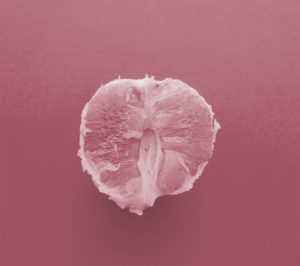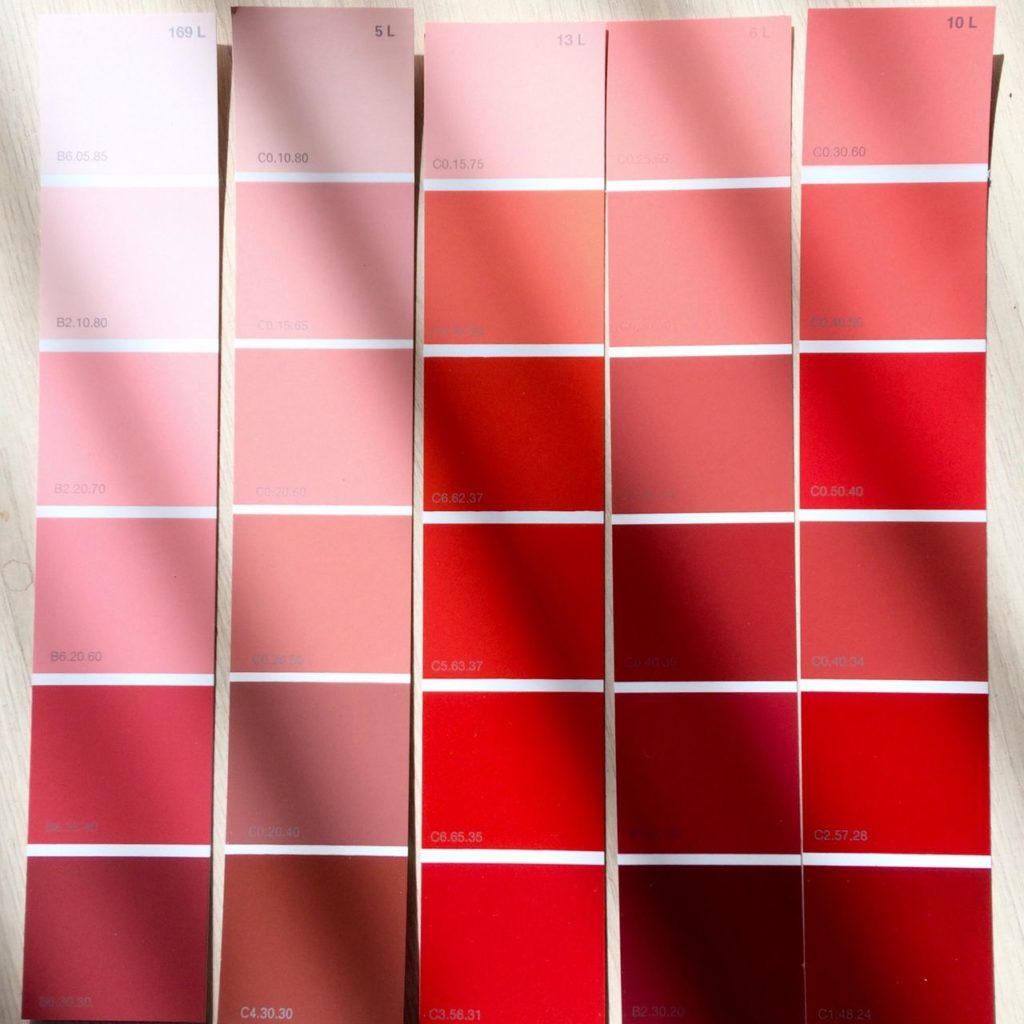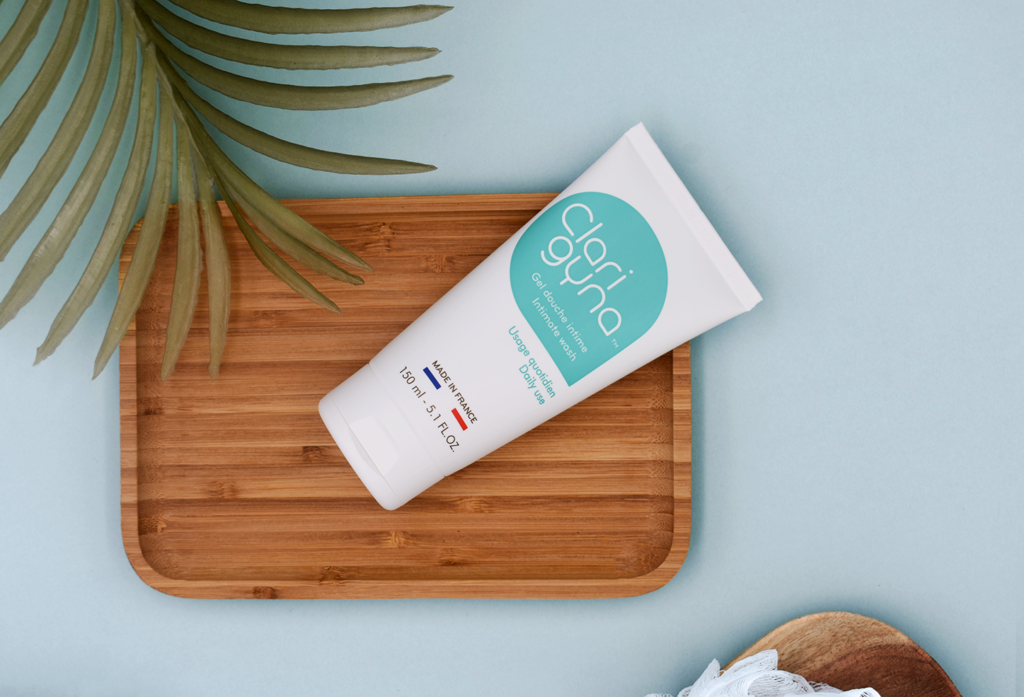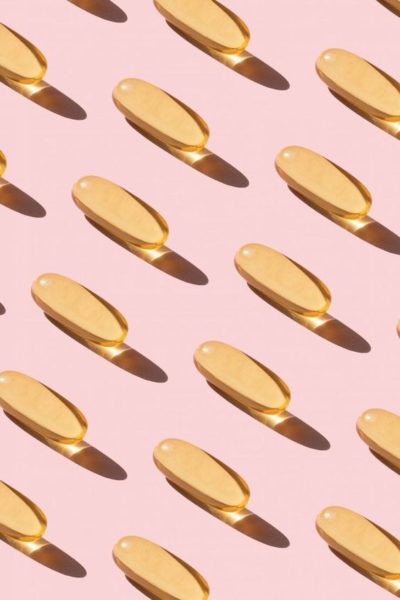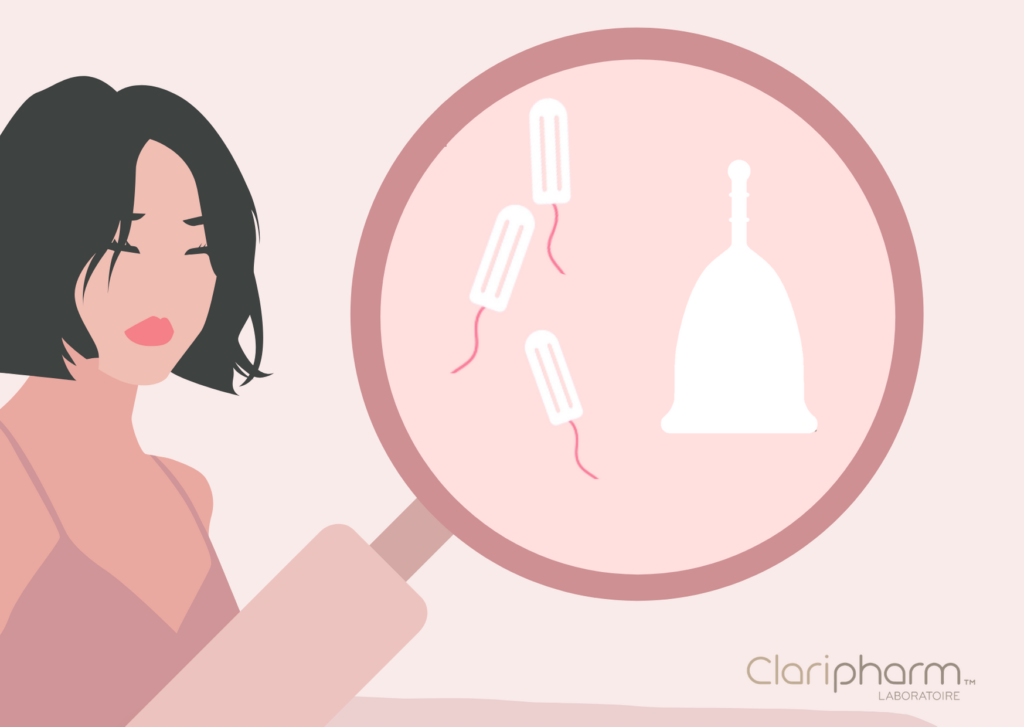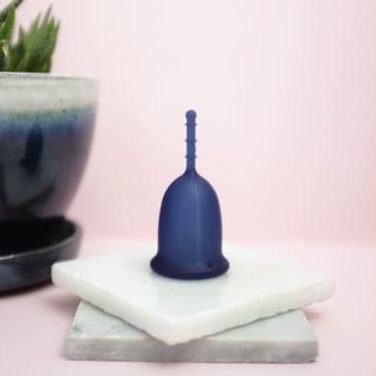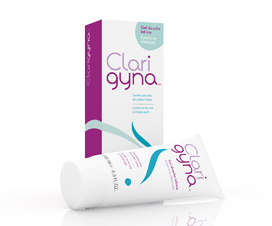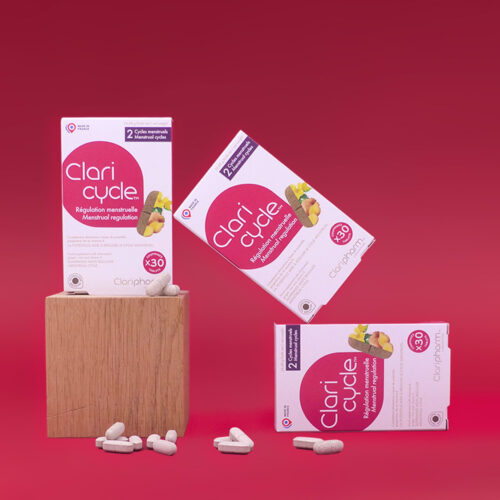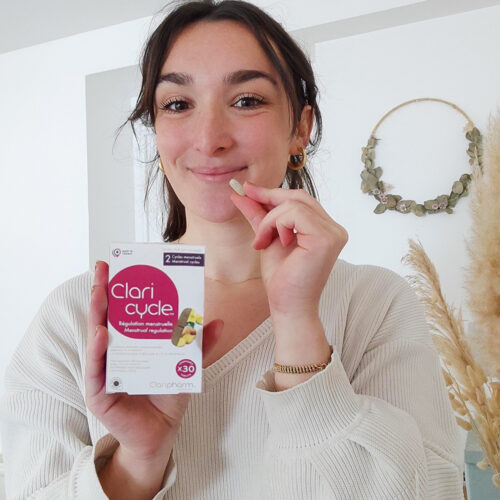Here they are, your periods has been arrived ! With more or less regularity, painful or tiredness. We give you all the advice you need to make the most of this often uncomfortable period !
Summary of the article:
Painful menstruation, or dysmenorrhoea, affects between 50 and 80% of women [1],[2].
According to a study[3] published in 2005, 50-70% of adolescent girls have permanent or occasional dysmenorrhoea. This is a significant phenomenon given that in France, painful periods are the leading cause of school absenteeism among teenagers and work absenteeism among women[4].
Why do periods hurt?
To evacuate the blood and mucous membranes during our period, several molecules trigger spasms in the uterine muscle. Among them, the prostaglandins, produced by the endometrium(the mucous membrane that covers the inner wall of the uterus) are the most active molecules. It is mainly under their action that the uterine muscle contracts. An excess of prostaglandins causes an abnormal increase in these contractions, which has the effect of compressing the small blood vessels of the uterine muscle and therefore partly depriving it of oxygen. It is this lack of oxygen, called hypoxia, which is the cause of most pain experienced during periods.
There are several ‘types’ of painful periods:
While we are all concerned by the rules, unfortunately we are not equal when it comes to pain.
It should be noted that the term “period pain” is used to cover two types of dysmenorrhea :
- primary dysmenorrhea strong : the famous natural cramps mentioned above. They are very common and mainly originate from the action of prostaglandins. These pains occur most frequently in adolescence and tend to decrease or even disappear completely with age.
- secondary dysmenorrhea strong :it rather affects adult women, who did not necessarily suffer from menstrual pain until then. These causes are physiological, related to a medical or gynaecological problem: genital infections, ovarian lesions, pelvic inflammatory disease, etc. There can be many different medical pathologies at the origin of secondary dysmenorrhea including endometriosis: a chronic gynecological disease that has been talked about a lot for several years.
When do you must consult?
If menstrual cramps are a brake on social or family life, if they prevent going to work, going to school or ruin life to the point of damaging morale, you should consult a health professional: gynecologist , pharmacist, midwife … or his general practitioner.
If the period becomes unusually painful when it was not the case before or if it is suddenly accompanied by heavy bleeding, do not hesitate to consult either. Particularly in case of fever. A health professional will be able to reassure and answer all questions.
How to relieve menstrual pain? The essential role of food.
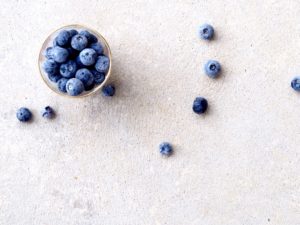
As we all know, the onset of your period and premenstrual symptoms (PMS) often makes you want to splurge on anything and everything, including carbohydrates, chocolate and especially all the sugar you can get your hands on!
As you know, too much sugar is not good for your health. Mais en période de règles, c’est encore plus grave!
Diet during menstruation can have a huge impact on the ailments caused by this period. Here are some tips on how to best manage your diet during your period!
Why is sugar bad during menstruation?
The ingestion of sugar causes inflammation in the body. And this inflammation releases prostaglandins that cause cramps and headaches.
If you are craving sugar, try to increase the proportion of protein and complex carbohydrates in your diet to encourage a slow and steady release of carbohydrates in your body, and thus avoid cravings.
How can I avoid fatigue during my period?
During menstruation we lose blood and for some women the blood loss can be significant. To alleviate anaemia, it will be important to favour foods that are sources of iron, such as red meat (beef, lamb, veal), green vegetables, protein-rich vegetable alternatives (soya, tofu) and legumes such as lentils or red beans.
Rules and intestinal transit
Hormonal changes have an impact on the health of the intestines. To maintain a healthy diet, here are a few things to consider when eating:
- Opt for foods rich in Omega 3such as fish which helps to obtain a good transit.
- Choose foods rich in good vitamins: vitamins from citrus fruits, antioxidants from small berries (blueberries, blackberries, strawberries, raspberries), and green leafy vegetables (spinach, cabbage).
- Think of slow sugarsfor continuous energy throughout the day.
- Focus on fibre by remembering to increase your portions of vegetables and legumes. This will help limit digestive discomfort and in particular bloating.
Hydration: drink a LOT!
Just like the fruits and foods mentioned above, drinking lots of water helps reduce the sensation of water retention such as bloating. The ideal would be to drink between 1.5L and 2L of water per day.
A helping hand: rely on food supplements.
If all these solutions are not enough, consider an additional supply of specific nutrients by taking a food supplement. For example, you will find iron, vitamin and plants specific to menstruation pains in our food supplement Claricycle.
How to relieve menstrual pain? The 5 essential vitamins and minerals
Eating during your period is an essential part of menstruation. Unfortunately, it is rarely enough to counteract all your ailments such as intense fatigue or painful periods. Supplementing a good diet with the right nutrients and vitamins will allow you to find an optimal nutritional balance and thus provide relief during this time of the month.
Iron
Periods cause more or less blood loss depending on each of us.
Blood loss means loss of haemoglobin, which leads to a risk of iron deficiency and therefore anaemia. Hemoglobin is a protein found inside red blood cells. It is responsible for the red color of the blood. Its main function is to transport oxygen from the lungs to the organs
Anemia is characterized by shortness of breath on exertion, fatigue, a feeling of being cold and chronic pallor.
We have all this slack during our period, and well it comes from there.
The body cannot synthesize iron and must therefore obtain it from food.
The ideal is therefore to supplement your diet with iron. It thus contributes to the normal formation of red blood cells and hemoglobin, and generally contributes to reducing fatigue.
Vitamins E
Vitamin Eplays many roles in the body due to itsantioxidant activity. In simple terms, vitamin E opposes oxidants, which are molecules that disrupt the functioning of our cells and weaken immunity.
It therefore helps to protect our cells, particularly when we are weaker during our periods and therefore more sensitive to oxidative stress.
Taking vitamin E has also shown positive results in the treatment of disorders associated with menstruation. (headache and premenstrual symptoms).
Calcium
Calcium is one of the most common minerals found in the human body. The calcium content can be up to about 1 to 1.2 kg in adults.
It is responsible for muscle contraction, nerve transmission, blood clotting and also plays a role in the release of hormones.
Calcium is present in limited quantities in the blood. For this reason, a diet low in calcium, for example during a diet, can create deficiencies.
Thanks to calcium supplementation, deficiency and therefore muscle contraction are avoided. Calcium prevents the abdominal muscle from tetanizing and contributes to its relaxation. We therefore avoid any contraction that could induce abdominal pain.
Potentilla
Potentilla is a plant that grows in the wild. There are several therapeutic indications such as therelief of acute diarrhea, or gastrointestinal spasms.
It contains herbs that regulate the menstrual cycle and have anti-inflammatory and pain-reducing properties.
In our food supplement Claricycle, we recovered aqueous extracts from aerial parts of cinquefoil.
2 scientific studies have proven the effectiveness of this plant in relieving pain associated with dysmenorrhea.
Achillea Millefeuille
Yarrow is a medicinal plant used for various pharmaceutical applications. The plant is used as an emmenagogue in menstrual disorders, i.e. it improves blood flow in the pelvic area and uterus.
All these ingredients have been selected by our experts when formulating our food supplement and have proven their effectiveness on painful periods.
Anti period pain: the Claricycle™ your solution for menstrual sensitivity
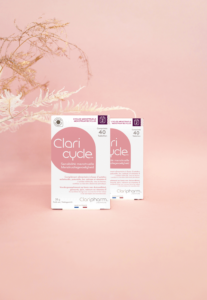
What is Claricycle™ ?
It is a food supplement, it is not considered a medicine.
A drug aims to prevent or cure a disease or symptom, a food supplement aims to supplement the diet and / or improve a physiological function, such as fatigue, sleep, stress, immunity, …
-
Why take Claricycle™ ?
This dietary supplement has been designed to help women cope better with their periods. To come up with an effective formula, we looked at the cause of the pain, which is most often linked to significant contractions of the uterus during menstruation. Our product is made in France, which for us is synonymous with high quality, because the traceability and manufacturing methods meet very strict specifications.
-
How to take Claricycle™ ?
The Claricycle™ is taken before the start of your period and during the first days of your period. Thus, for optimal effectiveness, we recommend taking it the 3 days before your period and the first 2 days. However, if you do not know exactly when your period starts, it can be taken on the first day of your period, ideally to spot the first signs of your period for optimal effectiveness.

- What is the composition of Claricycle™, what are the benefits of the ingredients?
Claricycle™ Menstrual sensitivity is a food supplement in the form of tablets, composed of minerals (calcium and iron), vitamin (vitamin E) and plants: cinquefoil, anserine and yarrow.
Each ingredient has a specific role in the formula and is delivered in a dose scientifically validated to have a significant beneficial effect.
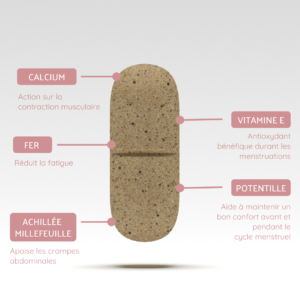
- Calciumprevents the abdominal muscle from paralyzing and helps relax it. It therefore acts on muscle contraction and reduces the intensity of pain.
- The presence of iron helps to compensate for losses during menstruation and reduce fatigue that can occur during this period.
- Vitamin E is an antioxidant that has shown beneficial effects in women with menstrual pain.
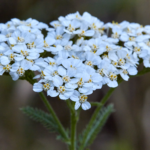 |
Yarrow, and in particular its aerial parts, are traditionally used in menstrual disorders. This plant soothes abdominal cramps.
Studies have shown that the herb has beneficial effects on reducing period pain when consumed 2 days before your period starts and 3 days after your period starts. |
 |
The cinquefoil anserine is traditionally used for pre-menstrual syndrome and studies have also shown that it helps reduce period pain
It helps maintain good comfort before and during the menstrual cycle. |
LIST OF INGREDIENTS: LOADING AGENT: MICROCRYSTALLINE CELLULOSE, POTENTILLE AERIAL EXTRACT (POTENTILLA ANSERINA), CALCIUM CARBONATE, MILLEFEUILLE FLOWER POWDER (ACHILLEA MILLEFOLIUM), ACHILLEA MILLEFOLIUM FERCERGLATE CORRECTOR, ANCIENT GLOBAL FERCERGLATE: OF MAGNESIUM OF FATTY ACIDS, COATING AGENTS: HYDROXYPROPYLMETHYLCELLULOSE, MICROCRYSTALLINE CELLULOSE, FATTY ACIDS; D-ALPHA-TOCOPHERYL ACID SUCCINATE (VITAMIN E).
| Active ingredients | Daily dose
(4 tablets) |
Plant equivalent | Reference intake |
| Iron | 10 mg | – | 71% |
| Vitamin E (α-tocopherol) | 11,6 mg | – | 97% |
| Calcium | 314 mg | – | 39% |
| Yarrow (Achillea millefolium)
Aerial parts powder |
600 mg | 600 mg | – |
| Silverweed (Potentilla anserina)
Aqueous extract of aerial parts of silverweed, ratio 4/1 |
1000 mg | 4 g | – |
-
Le Claricycle™ est utile pour le confort menstruel, peut-il également agir pour les femmes dont l’ovulation est douloureuse ou le syndrome pré-menstruel ?
The Claricycle contains ingredients as effective in relieving pre-menstrual syndrome as cinquefoil anserine.
The effectiveness of the plants present in the Claricycle™not having been evaluated on ovulation, and the taking we can not guarantee its effectiveness for this disorder. In addition, the use being around the period of the rules, its effects on ovulation are even less likely.
-
From what age can the Claricycle™?
We recommend using the Claricycle after several menstrual cycles to allow hormonal changes to regulate.
ndeed, during the first period, the cycles can be irregular and the periods painful, it is the primary dysmenorrhea, the Claricycle™can help manage any period sensitivity that may appear.
-
Where can we buy Claricycle™?
The Claricycle™is available on our website Claripharm.co.uk, but also in pharmacies and parapharmacies.
Intimate irritation during menstruation
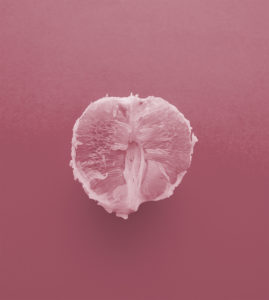
The itching in the private parts are very common and there are many kinds of itching, but there are also those that can occur during your period. Intimate irritations that are already basic are not very pleasant, but during their periods, it is even less so … Especially since during the period, the vaginal flora is more sensitive because it is more prone to the risk of attacks from bacteria.
So how do you avoid them? Where does this itching come from? The Claripharm Team brings you solutions.
 Pay attention to the frequency of your personal hygiene
Pay attention to the frequency of your personal hygiene
Despite the fact that the blood of our period is part of us and is completely natural, many of us want to get rid of it as soon as possible. We tend to want to wash more often just to feel cleaner and to avoid odors (and we understand you). Usually women wash more regularly during their period. But is it really good for our privacy?
The recommendations of the gynecologists are: no more than 2 showers per day. Beyond that, the body no longer lubricates enough to protect its privacy. Because yes, the vagina is a little magical, it cleans itself! So no need for internal cleaning and especially no douching! Douching the vagina unbalances the flora thus creating imbalances and infections. Once again, let nature take its course, the vagina cleans itself so let it work.
Our hygienic protections are not for nothing
In the majority of cases, the itching in the private parts is due to the hygienic protections not adapted to our vaginal mucosa or to our vulva which remain sensitive parts. Although unpleasant, this itching is fortunately not serious in the vast majority of cases.
The components of sanitary napkins and panty liners cause discomfort and then an overwhelming urge to scratch in some women. This is called, vulvar itching. 30% of women are allergic to disposable sanitary napkins. We then speak of itching but also vulvar eczema. And there it is more complicated. During vulvar itching, it is generally sufficient to remove the hygienic protection so as not to be embarrassed any longer, but if a persistent eczema appears, a consultation with your health professional and treatment should be considered.
Similar to vulvar irritation, you may observe vaginal irritation. They may be due to tampons. In fact, tampons dry out the vaginal mucous membranes enormously, which can create micro-lesions and scratch you. So why insert drying fibers into her vagina?
Why there menstrual cup is the best alternative to avoid intimate irritation during menstruation?
- Our menstrual cup has been tested.
We performed our biocompatibility tests on the Claricup menstrual cup. Biocompatibility, what does that mean? That we have tested the silicone in our menstrual cup so that it is not cytotoxic, not sensitizing and not irritating. These are tests that are not mandatory but let’s be frank, being the first users of our products, we had to do them for us, but also for you, because we are experts in our field: intimate health of the woman. And not only have we done these tests before, but also after manufacturing the Claricup, to ensure that nothing contaminates it during its manufacture.
- A very soft and non-absorbent surface
The Claricup menstrual cup is made from biocompatible and antimicrobial medical silicone. It is very soft and has a peachy skin effect. Unlike fibers in tampons, the menstrual cup does not dry out the vaginal walls and therefore does not irritate.
- Our customers tell us 🙂
“Very pleasant. Before claripharm I had other cups and this is by far the best I have tested. No leaks no irritation. Even to the touch you can feel the difference. ”
“I have a very light flow and the cup is much less irritating because more dryness due to the tampons. ”
A little more advice
It may sound basic, but reminders are always good!
With its cup, we prefer cotton panties, which will respect our privacy. Cotton helps prevent irritation and protects the vagina.
If you notice that your itching persists outside of your period, it is undoubtedly another type of irritation (allergy, crabs, yeast infection, etc.). We invite you to read our article on the subject here.
Sources: [1]
Schroeder B. Dysmenorrhea and pelvic pain in adolescents. Pediatr Clin North Am June 1999; 46 (3): 555 – 71
[2] Kwon JS. Dysmenorrhea. Journal SOGC août 1997 : 955 – 62
[3]French National College of Gynecology and Obstetricians
[4] Source: social security in .




